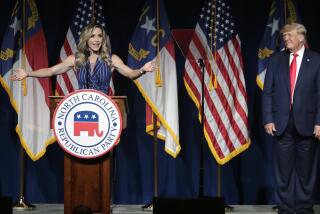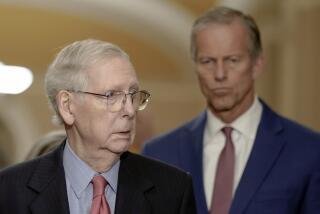Alexandria, Va., hosts a quiet hub of Republican power
Landini Brothers is an old-fashioned Italian joint that lacks the sleek aesthetic of the power lunch spots in Washington, and makes no apologies for it. The walls are stone, the ceilings are low and a sign behind the bar declares: “Unattended children will be given an espresso and a free puppy.”
But it’s one of the best places to catch top Republican operatives in action, thanks to one attribute the trendy eateries near the White House cannot claim: proximity to the GOP’s political hub. Within several blocks of the restaurant’s King Street location are more than two dozen Republican media, polling and public relations firms.
Tucked away discreetly in the quaint row houses of Old Town Alexandria, the political shops are largely invisible to passersby. But they are mightily influential in shaping the party’s message and strategy. Many helped produce and place the ads that battered Democratic candidates in November’s midterm election. Several of the secretive nonprofit organizations that paid for those ads are also based in Alexandria.
Together, they’ve turned King Street into a small-town version of K Street, Washington’s famed corridor of lobbying and law firms.
“We used to always joke that if they wanted to wipe out Republican Party, all they had to do was [destroy] Old Town,” said GOP ad maker Jim Innocenzi, whose office is a block south of King Street.
The glut of Republican consultants leads to sidewalk chit-chat and tactical confabs in local restaurants. The tavern Jackson 20 — named for President Andrew Jackson, whose image is on the $20 bill — is said to have the best breakfast. Landini Brothers and the Majestic Cafe are lunch favorites. (Recently spotted dining together at the latter: veteran pollster Tony Fabrizio and Phil Musser, who runs the political action committee of former Minnesota Gov. Tim Pawlenty, a possible 2012 presidential candidate.) The Morrison House — dubbed “MoHo” by some — is the place for after-work libations.
“It’s not like we all get together in some bunker in the morning,” joked Craig Shirley, an author of books about Ronald Reagan’s presidential campaigns whose public relations firm, Shirley & Banister, is in a 1740-era townhouse off King. “It’s nice because it’s a heck of a lot cheaper than K Street and you can be on Capitol Hill in the same amount of time.”
The first major Republican firms arrived in the 1980s, drawn by affordable rent, lower taxes and the easy commute for Virginia residents. Today, Old Town is home to such groups as the American Conservative Union and L. Brent Bozell’s Media Research Center. It’s also attracted onetime K Street denizens such as former GOP national Chairman Ed Gillespie, who opened a consulting firm on Prince Street after leaving the White House in 2009.
A few blocks away, above the boutiques on King Street, are 60 Plus and the Center for Individual Freedom, two of the conservative non-profit groups that spent millions on political ads targeting Democrats this past fall.
“I think for a lot of conservatives there’s something about being outside Washington, even though it’s not very far outside,” said Greg Mueller, whose Alexandria-based CRC Public Relations has represented clients such as the Swift Boat Veterans for Truth, a group that attacked Democratic Sen. John F. Kerry’s Vietnam War record during the 2004 presidential campaign.
Still, Alexandria — seven miles from downtown Washington and just across the Potomac — is a somewhat incongruous base for conservatives. The town voted overwhelmingly for Barack Obama in 2008 and is known for its liberal politics.
“We’re very open and everyone is welcome, even Republicans,” said Brian Moran, chairman of the Virginia Democratic Party, who lives in Alexandria and whose brother, James, represents the area in Congress. “But I do hope they entered short-term leases, because the Democrats will be back in charge in 2012.”
A walking tour of Old Town provides a window onto the extensive GOP network that has taken root. Start off with a cappuccino at Landini Brothers at 115 King, then stroll west, past the 1724 home of city founder William Ramsay, now the Alexandria Visitors Center.
At 515 King, three floors above a SunTrust Bank branch, is the small, unmarked office of 60 Plus, which bills itself as a conservative version of AARP. The organization plowed at least $7 million into defeating Democratic House candidates in 2010, according to the nonpartisan Center for Responsive Politics. There’s no sign on the door, but a large photo of former President George W. Bush and 60 Plus Chairman Jim Martin can be glimpsed through the window.
Farther west on King, above the fabric store Calico Corners, is the office of GOP media buyer Kyle Roberts, who handled the presidential campaign account of Sen. John McCain and running mate Sarah Palin in 2008. At the same location are Scott Howell, a Dallas-based ad maker, and political consultant Blaise Hazelwood, former political director of the Republican National Committee.
Proceed west to Alfred Street. A half-block north, in a stately townhouse, is the polling firm run by Whit Ayres, who moved here from Atlanta in 2003 to be closer to the GOP political center.
“If a client comes to town to look at polling firms, you’re more likely to get an interview if you’re along the tracks they’re walking,” Ayres said.
Another block west along King are two row houses owned by Tony Fabrizio, who was chief pollster and strategist for Bob Dole’s 1996 presidential bid. His unmarked office is at 915 King above Ten Thousand Villages, a store featuring fair trade crafts from countries such as Uganda and India. He shares the second floor with Multi Media Services, a media-buying firm that has placed ads for the U.S. Chamber of Commerce and the Republican National Committee.
Next door, above a spa that offers massages and Botox treatments, is the Center for Individual Freedom, an organization formed in 1998 by a former tobacco lobbyist. Fabrizio is listed in public records as its chairman. In the recent midterm election, the center spent at least $2.5 million on negative ads against about 10 Democratic members of Congress.
There’s no sign or nameplate for the center, just an unmarked buzzer next to a locked wooden door.
Take a right on North Patrick Street and left on Cameron Street to find the American Conservative Union, housed in a modest gray row house with peeling green shutters. Several blocks south, a large brick complex at 325 S. Patrick Street houses the Parents Television Council and Media Research Center, conservative watchdog groups founded by Bozell, nephew of the late arch-conservative William F. Buckley Jr.
The tour is not complete without a drive past 66 Canal Center Plaza, a modern office building along the Potomac. Suite 555 houses a battery of Republican political shops. There’s Americans for Job Security, a pro-business group that ran at least $9 million worth of ads against Democrats in 2010, and Crossroads Media, which placed many of those and similar spots.
Crossroads’ founder, Michael Dubke, is a partner with GOP strategist Carl Forti in another firm in Suite 555, the public affairs consultancy Black Rock Group. Forti is also political director of the nonprofit groups American Crossroads and Crossroads GPS — not to be confused with Crossroads Media — which together raised more than $70 million for conservative candidates last year.
Forti said he picked the location because the rent is cheaper than in Washington and it’s close to his Mount Vernon, Va., home.
Ad maker Steve Murphy, who runs one of the few Democratic political shops in Alexandria, has another theory: “What I’ve noticed over the years is that Democratic firms want to be in the District of Columbia, where they are proud to associate themselves with the federal government, and Republican firms want to be in northern Virginia, where they are proud to disassociate themselves from the federal government. It really is a political cultural thing.”
Tom Hamburger in the Washington bureau contributed to this report.
More to Read
Get the L.A. Times Politics newsletter
Deeply reported insights into legislation, politics and policy from Sacramento, Washington and beyond. In your inbox three times per week.
You may occasionally receive promotional content from the Los Angeles Times.





